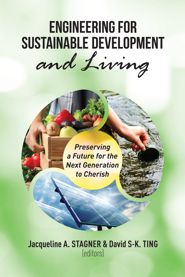
Engineering for Sustainable Development and Living
Preserving a Future for the Next Generation to Cherish
by Jacqueline A. Stagner & David S-K. Ting (editors)
Author website: http://dskting.ca/
- Number of Pages: 330
- ISBN-10: 1599426145
- ISBN-13: 9781599426143
- Publisher: BrownWalker Press
- Year: 2020
- Category: Technology, Engineering & Transportation, Biology & Natural Sciences
Synopsis
What can we do to preserve a future for the next generation to cherish? A potent answer is to exercise good stewardship in realizing more sustainable living and development. This volume brings together experts from around the world to disseminate the latest knowledge and research toward this end, i.e., engineering for more sustainable development and living. Let us learn from a living cell that utilizes inherited biological intelligence to organize its resources for current needs and future existence. We also have the responsibility to ensure universal access to electricity and increase the share of renewable energies. Cost effective hybrid renewable energy systems should also be considered and furthered. Advancing energy storage is a necessary striving for managing a future "toilet paper crisis." More accurate accounting of weather is crucial in furthering energy efficiency for human thermal comfort. With cooling making up the highest energy cost in many medical structures, combining low-energy building strategies with source-efficient and low-cost manufacturing envelopes can contribute effectively to mitigating climate change. To realize calculated improvements in practice, we must assess the performance after implementation of the promising measures. Construction is definitely the right place to start incorporating sustainable development and living. Another means to promote sustainability is to improve engineering system performance. Simple means such as a rightly positioned cylindrical rod can enhance systems that involve heat exchangers. An important lesson came through dealing with COVID-19, teaching us to provide adaptation strategies through water-energy-food nexus planning, building resilient communities for tomorrow.About the Author
Dr. Jacqueline A. Stagner is the Undergraduate Programs Coordinator of Engineering at the University of Windsor. She is also an adjunct graduate faculty member in the Department of Mechanical, Automotive and Materials Engineering. She co-advises students in the sustainability and renewable energy areas, in the Turbulence & Energy Laboratory. She has co-edited two volumes.Dr. David S-K. Ting is the founder of the Turbulence & Energy Laboratory, University of Windsor. As a professor in the Department of Mechanical, Automotive and Materials Engineering, he supervises students primarily on energy and flow turbulence. To date, he has co/supervised over seventy-five graduate students, co-authored more than one hundred and forty journal papers, authored four textbooks and co-edited ten volumes.






 View or Post a Review at Amazon.com
View or Post a Review at Amazon.com